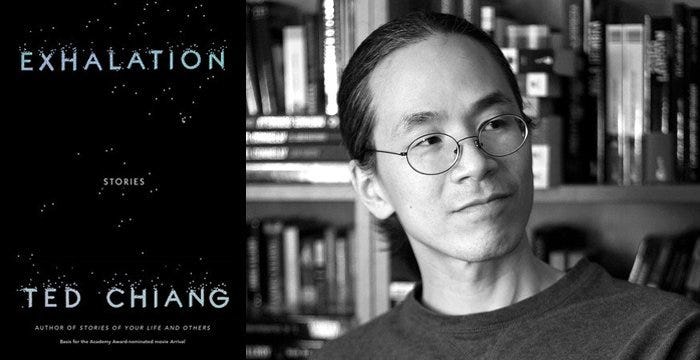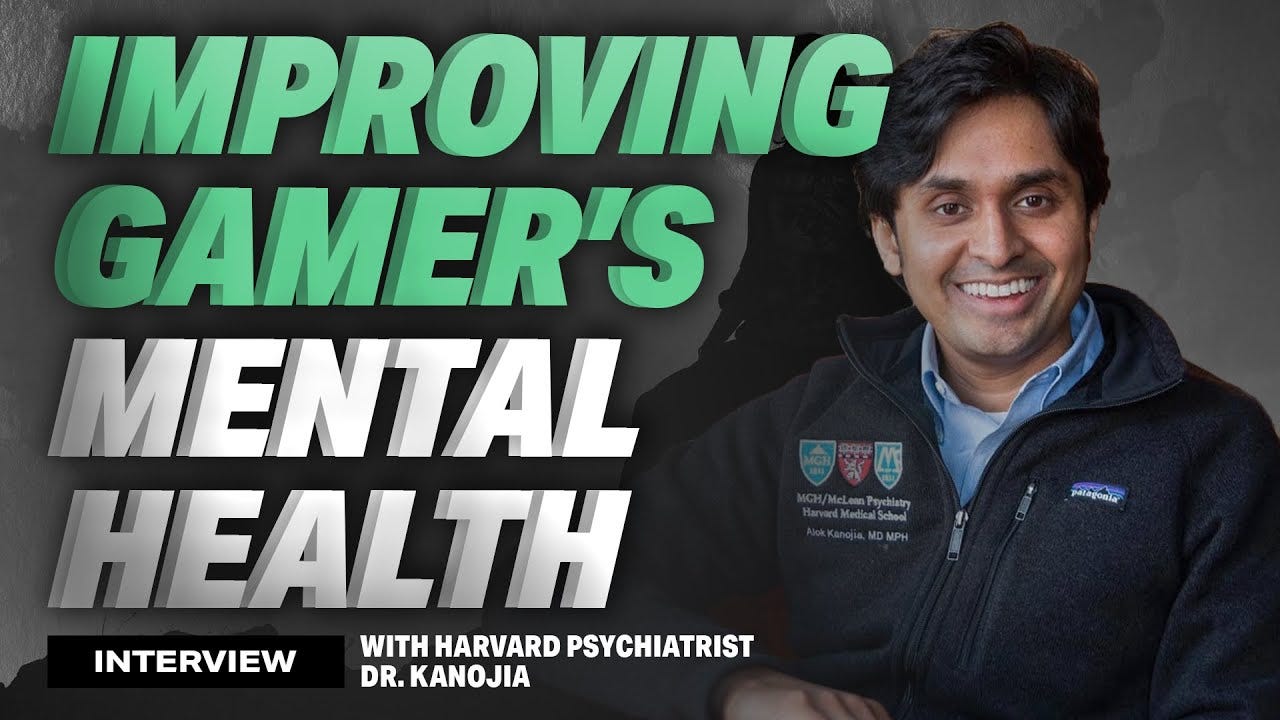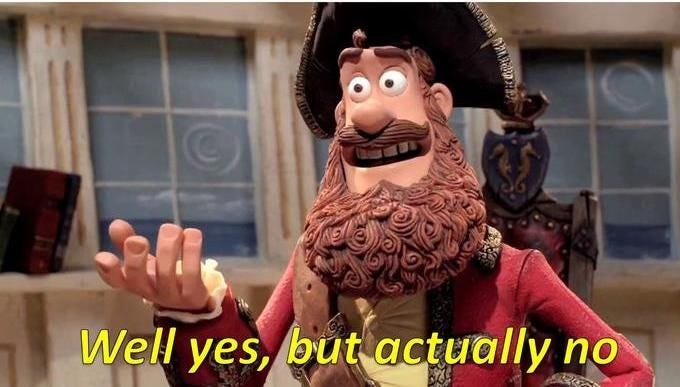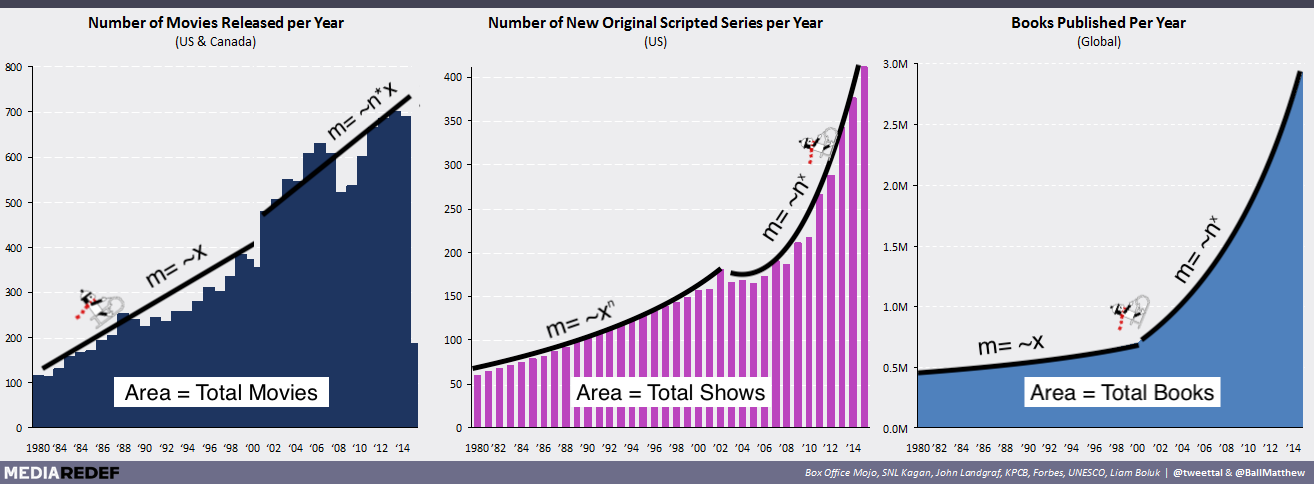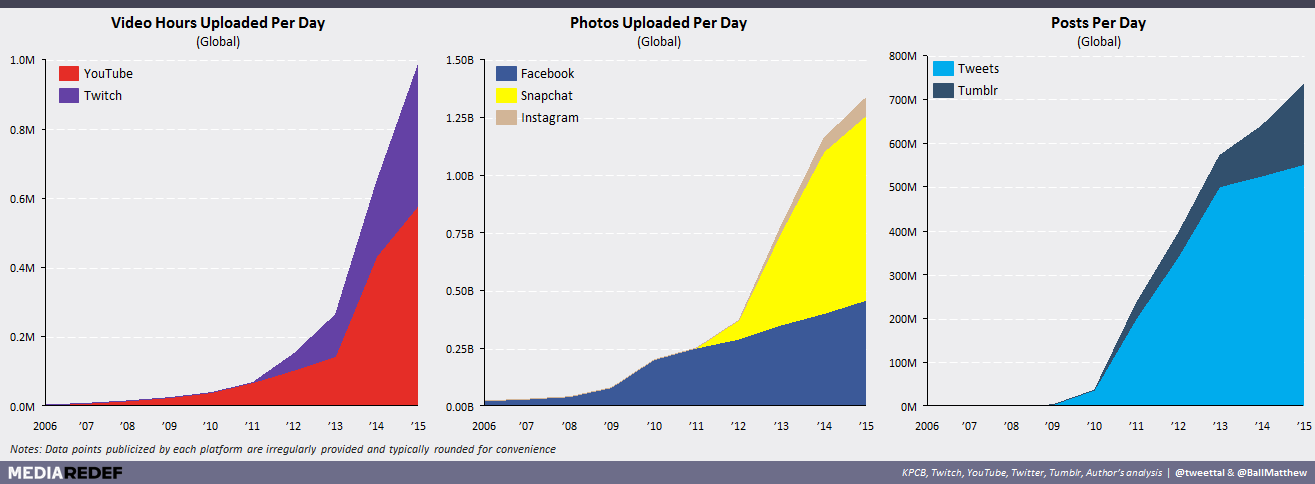Surviving and Thriving in the Content Explosion Pt 1 + Some Recs
This is the first in a two-part series around the explosion of media creation. Today we’ll talk about what’s changing and a glimpse of the new perspectives we’ll need to make the most of it. It’s honestly kind of boring, but it’s important context to set up before talking about the more practical and meaningful stuff in part two.
But first, I've got two media recommendations that have subtly changed my life. This should be about a 10-minute read.
What I'm Reading: Exhalation by Ted Chiang
I love this book! It's a collection of contemplative fiction/sci-fi ish short stories that "will make you think, grapple with big questions, and feel more human" (according to Obama). Couldn't agree more. Over the last 6 years, I've almost exclusively read nonfiction, information-heavy books. I love taking in ideas that change how I think, and insight-dense text felt so productive. I learned that idea can be useful until it's not. Information alone rarely changes how we live. More importantly, the written form can be something more than what assists us in our material life. i.e. - sometimes you just need a good story!
The themes are similar to what would be in Black Mirror but way less spooky. I knew absolutely nothing about the specific topics of each story, and that made the reading experience just a bit more delicious. I want to pass that gift onto you as well. Up to you if you want to read more about it!
Here are a few reasons you may not enjoy it. One of my friends thought that the characters between the stories were a bit too similar. Since the stories range from 3 to 100 pages, there’s also not a ton of room for the characters to be as developed as they’d be in a novel. Lastly, shit gets pretty existential, so if you’re not in a headspace to tackle those questions, it might be better to avoid this for now!
If you're curious and want a low-stakes way of seeing if you'd like it, join me next Sunday, Aug 16th. There’s no need to buy the book or prepare anything ahead of time. One of the stories is published online, and it's short enough to read in 25 min. We’ll actually read together (silently) and take the next 45min to talk about it. Sign up below if you’re interested!
What I'm Watching: HealthyGamerGG (Dr. Alok Kanojia)
This dude changes lives. DrK is a Harvard trained psychiatrist (and UT Austin alum 🤘) that talks to Twitch streamers and gamers about their problems. Think Dr. Phil, but more modern, nuanced, and effective. He combines his medical training with an eastern framework of meditation, yoga, and dharma to help people better understand themselves, heal from suffering, and live more fulfilling lives.
It's fucking heart-melting to see the healing power of conversation during one of his 2+ hour sessions. The videos are long, and they're worth it. I’ve done emotional work from watching a couple dozen hours of these videos, taking notes, and reflecting on my own experiences. These conversations go deep and can be challenging, but if you're ready for that, I highly recommend them. He was originally focused on gamers, but these conversations apply to everyone (and that’s kind of the point). Experience the power of AoE healing.
Here are a few great ones, taken from their newsletter:
Paul, the "incel" - Dating these days is tough. If you struggle with dating, self-acceptance, and the opposite gender in general, this was one of those where the last 30 minutes of payoff is worth the struggle of the first hour. Go to interview.
Mizkif - If you KNOW you're smart, but you FEEL really dumb, check this out. If you struggle with ADD/ADHD or just have trouble learning in traditional ways, this is a great look at understanding what's going on. Go to interview.
Reckful Pt 1 & Pt 2 - Huge breakthroughs in processing depression as a result of childhood loss. Go to interview.
Coconut B - Abuse and trauma are tragically something many of us grow up with. Coconut asks how to STOP the cycle. One of the most important things we can ask. Go to interview.
Sweet Anita - If you're one of those people that always puts other people first, chances are you might also be kind of exhausted. Anita's got an incredible personal story, and she's a ray of light. Bonus: it includes chocolate meditation. Go to interview.
Surviving & Thriving in the Content Explosion (Part One)
Exponential Growth Can Be Hard to Fathom
I don't think I'm alone in believing that there's too much content out there. Nostalgia aside, every year feels like the golden age of media. There are more great songs, movies, videos, blogs, and podcasts to view than ever before. Our media platforms keep getting better and better!
That seems natural, right? Hasn’t it always been this way?
While it's obvious there are more things this year than last year, what's not obvious is how much more there is. Let's look at the data.
According to this research done in 2015 (with my slope lines overlaid), you can see that growth for traditional media took off in the 2000s. As things became easier to make and distribute, industries could just support more artists and creators. But the shifts in growth rates & the new growth rates themselves are all quite different due to the change in the level of gatekeeping. While producing big movies continue to be gatekept by major studies & budget, anyone can publish a book for less than the price of a basket of Korean fried chicken.
The biggest shifts in media growth happen when technology changes the fundamentals of gatekeeping. No technology does this more than the internet. You thought books took off? Look at social media:
Those are some massive numbers, and this is all data that's 5 YEARS old! It can be hard to really make sense of what these growth rates mean. One research paper from 2013 found that 90% of the world's data was created in the previous two years (2011 & 2012).
That exponential growth rate seems to have continued steadily which means we've been creating 90% of the total data that's ever existed *every 2 years*.
Think of all the media, books, data, files, etc that exist currently. If this continues, in two years, that will be just 10% of all the data that exists. In 4 years that's 1%, and in 6 years that's .1%!
This is mind-boggling crazy to me. We're getting increasingly connected to the nearly 8 billion other people on our planet, leading to more ideas, more knowledge, more entertainment - just more EVERYTHING than ever before.
Of course, that does come with some challenges.
We *Live* Linearly
As all this growth happens before our eyes, I'm reminded that our daily lives are not exponential. We’re limited by our biological bodies and 24 hours in a day. It’s dangerous to disrespect those limits. There is no 100x or 1000x hack to lengthen our time.
So, how do we make the most of the moments we have?
There are practical problems to all this best summed up by my friend Anjan:
In a world of infinite information, your most important skill is to navigate the mazes of information out there. Anytime you run a maze, you have to know when to stop running down a corridor because it's going to lead to a dead end, when to go even further because it may be the way, and you need to know when to switch to a new path.
So you could say navigating and learning in the age of the internet and information overload is about learning how to learn, learning when to not learn, learning to stop. Putting 30 seconds in to see if it's worth 5 minutes and putting 5 minutes to see if it's worth an hour. When should I give up on something and when should I go deeper? Cuz that's the hardest thing, right? There'll be 500 articles you'll get recommended to on Twitter, and how do you know what to click on? These are all practical decisions we have to make.
This breaks down to 5 primary skills that we need to focus on to thrive in this new world: Intention, Selection, Viewing, Stopping, and Recommendation.
To Be Continued
Subscribe to get notified when it’s out:
Update (November 2, 2022): this will not be continued, lol.


